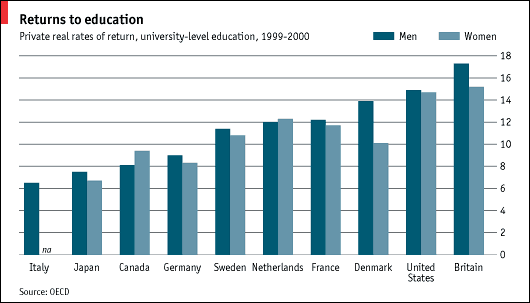
 knowledge
knowledge
1. Tertiary
societies export

 knowledge
knowledge![]()


![]()



|
From an industrial economy |
to |
a tertiary "knowledge economy". |
|
Ordinary "communicative competence", such as that described by the Common European Framework, is sufficient in an industrial economy that produces TV sets: and computer hardware. This is because specifications speak mostly for themselves. |
|
"Communicative-cultural competence", on the other hand, is necessary in a tertiary "knowledge economy" that exports TV programs and networked workload schemes. Here the value of these intangibles must be expressed in terms that the "other-culture interlocutors" can relate to. |
Direct connection: higher spending for education = higher Gross Domestic Product (GDP) (Prodotto Interno Lordo)

Education
is also economically
beneficial for individuals:
“University education is the best investment most people can make. The OECD’s new estimates of the annual returns to successful students range from 6.5% in Italy to 17.3% in Britain. The calculation treats the costs of study, including earnings forgone, as the investment; and the gains in post-tax earnings above those of school-leavers as the pay-off. Shorter university courses are one reason why returns are so high in Britain.” -- The Economist 31 October 2002